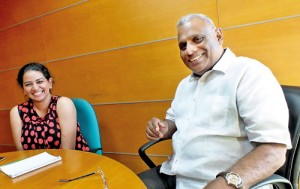Converting municipal waste to green energy
An Australian-based Sri Lankan entrepreneur has proposed a novel solution to get rid of one of the country’s stinking problems – transforming garbage to energy.

Kumar Perumal, Chairman, Endeavour Energy Corporation Ltd with company engineer, Ms. Wasuda Abeyratne sharing their views with the Business Times (BT).
While the concept of transforming garbage to energy is not new and has been proposed in the past with these proposals often thrown to the WPB (waste paper bin) due to bureaucratic lethargy, red-tape and corruption, Kumar Perumal says he has a more practical, quick-fix solution to this burning and unhealthy issue.
His company, Endeavour Energy Corporation Ltd (EECL), is capable of setting up 10 megawatt (MW)-capacity energy plants within a period of four to five months near any city. The company has got Board of Investment approval for one such 10 MW plant using Colombo city garbage and is now in the process of getting the formalities cleared. The plant will come up in Ja-Ela.
While 3.500 metric tons of municipal solid waste (MSW) is generated daily in the Western Province – Colombo Municipal Area, only around 2,100 to 2,400 tons are collected, Mr. Perumal, chairman of Endeavour, told the Business Times in an interview at his Colombo office discussing various concepts and easy solutions to the city’s garbage problem.
EECL is an Australian-based Sri Lankan International corporate entity and Mr. Perumal (its chairman) is in Sri Lanka to launch green energy projects by converting municipal waste into energy. Endeavour’s long-term commitment in the Asia Pacific region is strategically focused towards the development and operation of Green Energy projects, in particular Waste to Energy (WTE) Plants, refuse-derived fuel plants and associated industries processing solid and liquid waste. Endeavour’s complimentary core focus is also into bio fertilizer production facilities.
He said that what they are doing here now is to convert municipal solid waste into ‘Residue Derived Fuel (RDF)’ and for that he said: “We are building a power plant to get rid of waste totally”. He said that there is tremendous local talent to do this job and indicated that several Sri Lankan
Converting municipal waste to green energyuniversities have identified this need and now started to produce graduates in green technology. When explaining the intricacies of EECL’s task of converting garbage into energy, he was joined accompanied by the company’s engineer Ms. Wasuda Abeyratne, a BSc in Green Technology Development of waste management from the Ruhuna University.
Putting up a plant would cost around 3.5 million Euros, he said and indicated that when these plants are built in locations where garbage is available they could cut down transport cost. He said that they are also working on studies on short term and long term solutions for the municipal solid waste generated in the Western Province and how to process municipal solid waste instead of dumped them in land-fills.
With a solid knowledge base, he said that he has made a study tour to several European countries to see how the western world is tackling their day-to-day solid waste garbage. He said that they are putting up RDF plants to deal with daily waste, segregated or non-segregated – things like pet-bottles, corrugated paper, polythene, etc.
They are shredded into minute particles, then dried and bailed and sent to cement plants and power plants to produce cement and generate power, Mr. Perumal said adding that the biodegradable material is then sent to the plant to produce high quality compost.
The company is also going ahead with another project to build an organic fertilizer plant in Bingiriya producing around 200,000 metric tons per year that could be used in the paddy fields, tea and vegetable plantations. This project will be completed in the early part of next year, he said.
Discussions have already been held with the Rubber Research Institute (RRI) and Tea Research Institute (TRI) with regard to this and the project would cost around US$ 60 million.
He said that the plant that generates power out of solid municipal waste in Sri Lanka would become a model to the entire Asian region as they intend to expand into this region with the experience they gain from Sri Lanka.


